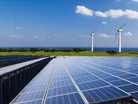Australia could have 100% renewable electricity by 2030s, says new report

Australia is on course to have 100% renewable electricity by the 2030s, according to a new report from the Australian National University.
If the country maintains its current rate of installations - 10,400MW of new renewable energy is set to be added in 2018 and 2019 - then it will accelerate beyond its Renewable Energy Target.
Projections indicate that Australia will have 29% renewable electricity in 2020, and 50% in 2025. Electricity emissions are estimated to be reduced by 26% by 2021, and the electricity sector on its own could meet Australia’s entire Paris emissions reductions target of 26% by 2025.
See also:
- OUT NOW! Business Chief, Asia-Pacific edition - September issue
- Tourism Holdings wins highest award at New Zealand Tourism Awards
- New Zealand’s BNZ deemed Small Business Bank of the year by Canstar
"All the evidence points to Australia’s capacity to be a renewable energy superpower, with all the economic and environmental benefits that come with that," said Professor Ken Baldwin, Energy Change Institute Director. "We need Australia’s governments to put in place the right plans for the renewable energy train to have a smooth ride."
Professor Andrew Blakers, ANU Research School of Engineering, added: "The Australian renewable energy industry is unequivocally demonstrating that it has the technical capability to deliver vast quantities of cheap, reliable, secure and zero-emissions energy."
According to the research, the new capacity will be divided approximately equally between large-scale solar photovoltaics (PV), wind farms and rooftop solar PV.
Featured Articles
Nirvik Singh, Global COO and President International of Grey Group, cultivating culture and utilising AI to enhance rather than replace human creativity
On a mission to accelerate the adoption of sustainable energy solutions, US$30 billion Chinese tech firm Longi is not just selling solar – but using it
Armed with an ambitious billion-dollar strategy, Samsung is on track to achieve net zero carbon emissions company-wide by 2050 – but challenges persist

